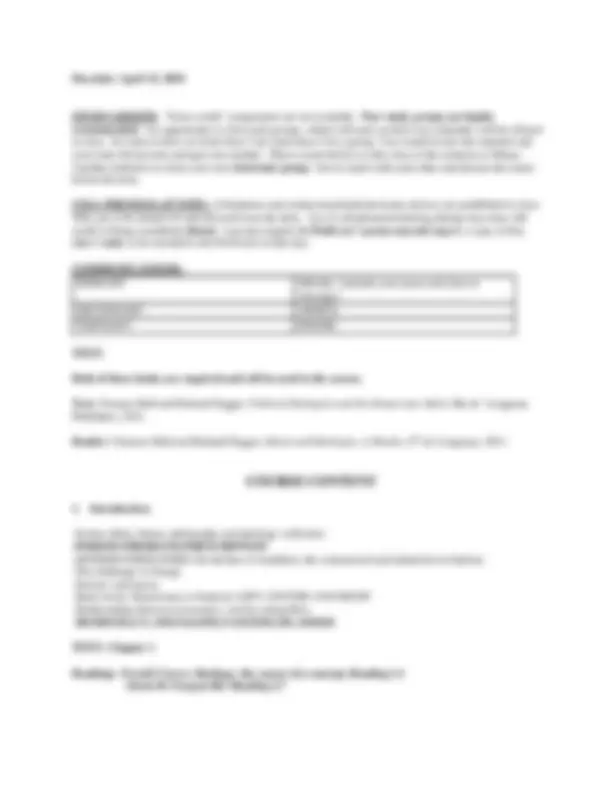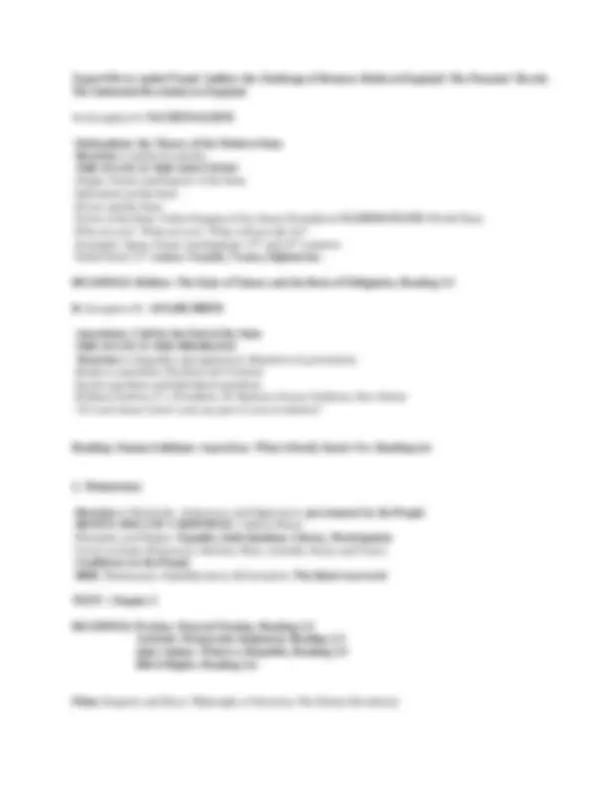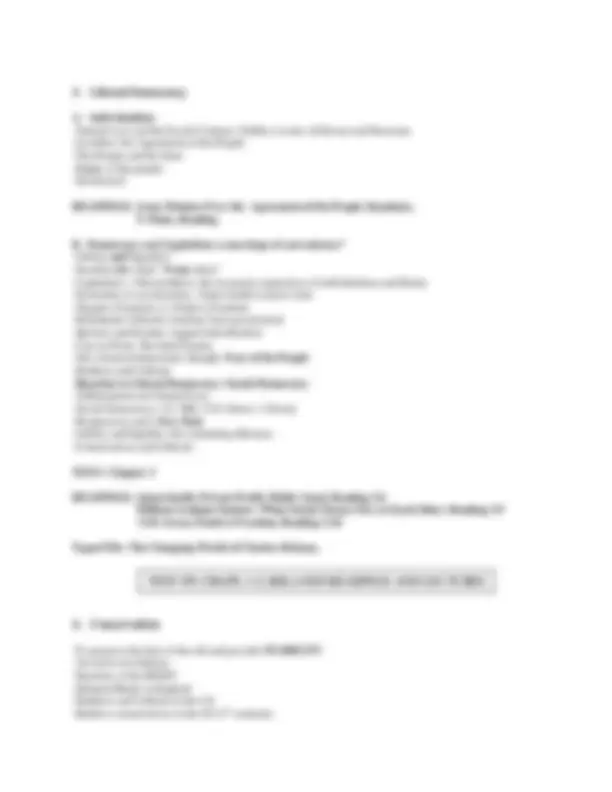





Study with the several resources on Docsity

Earn points by helping other students or get them with a premium plan


Prepare for your exams
Study with the several resources on Docsity

Earn points to download
Earn points by helping other students or get them with a premium plan
Community
Ask the community for help and clear up your study doubts
Discover the best universities in your country according to Docsity users
Free resources
Download our free guides on studying techniques, anxiety management strategies, and thesis advice from Docsity tutors
The course description and policies for the Modern Political Ideologies course at Bergen Community College. The course focuses on key political ideologies such as Democracy, Socialism, Communism, Fascism, and Islamism. The document also includes information on attendance policy, cell phone and laptop use, grading, tests, and the portfolio-essay assignment. The readings and topics covered in the course are also listed. a comprehensive overview of the course and its requirements.
Typology: Exams
1 / 7

This page cannot be seen from the preview
Don't miss anything!




Modern Political Ideologies will focus on the key ideologies that have dominated contemporary world politics. Such theories as Socialism, Communism, Fascism, Democracy and Islamism will be studied.
LEARNING OBJECTIVES: Students will be able to:
SICK DAYS/PERSONAL LEAVE DAYS/ATTENDANCE POLICY : It is expected that students will attend all class meetings. If a student misses more than three weeks worth of classes throughout the semester he/she will not pass the course. For example, if the course meets twice a week, no more than six absences are tolerated, for any reason. The student will not pass the course for reasons of absence alone. For a course that meets once a week, the maximum number of absences tolerated is three. Three latenesses equal one absence; classes when tests are held are included as classes. Illness, accidents and business emergencies sometimes occur; therefore it behooves everyone to anticipate these emergencies by being in class routinely. Look upon absences as your sick days and personal days on a job: use them when necessary; take too many and you lose the job! (If you are late be sure to see the Professor that class lest it be counted as an absence.)
There are no “excused” absences; only absences. If you are involved in school activities, such as athletic teams, plays or student government ensure that you carefully program your personal days. The same is true of emergencies at work or home, etc.
Cell phone use is prohibited in class. They are to be turned off and removed from the desk. Violation of this policy results in being recorded as absent. Laptops may be used with the permission of the Professor for taking notes. A copy of the notes taken that class must be emailed to the Professor by the end of the day.
Approximate time of tests is indicated on this outline; exact dates will be announced one week prior to a test. BE THERE! Due to the tendency of a small number of students to abuse normal class procedures the following information is called to your attention: Makeups for missed exams are granted only for serious reasons at the discretion of the Professor; Students requesting a makeup should be prepared to take it the day they return to class; Makeups will not normally be during class time; only one makeup per semester is allowed. Tests will include material from all sources: text, readings and lectures.
PORTFOLIO-ESSAY : This research assignment is designed to focus on one, relevant, current topic based on articles from the newspapers, especially the New York Times, www.nytimes.com, and other computer accessible sources, such as Web sites. This assignment will also introduce students to the wide range of political events related to this course, which occur during the semester and which are discussed in class.
identifying and justifying your topic. Without the early research and topic approval the final essay will not be accepted.
The first part of your final essay should identify the ideology you have chosen and describe its key elements. Then you should integrate your articles to show the current status or impact of that ideology in the world today. Be sure to show both sides of the issue.
Topics you should consider are:
The important point is that you find current sources in the NY Times and other places such as web sites.
Tapes/CDs in Audio/Visual: Galileo: the Challenge of Reason, Medieval England: The Peasants' Revolt, The Industrial Revolution in England.
-Nationalism: the Theory of the Modern State
READINGS: Hobbes: The State of Nature and the Basis of Obligation, Reading 3.
Reading: Emma Goldman: Anarchism: What it Really Stands For , Reading 6.
TEXT: Chapter 2
READINGS: Pericles: Funeral Oration, Reading 2. Aristotle: Democratic Judgment, Reading 2. John Adams: What is a Republic, Reading 2. Bill of Rights: Reading 2.
Films : Emperor and Slave: Philosophy of Stoicism, The Puritan Revolution
A. Individualism -Natural Law and the Social Contract: Hobbes, Locke, Jefferson and Rousseau -Levellers: the Agreement of the People -The People and the State -Rights of the people -Secularism!
READINGS: Army Debates Over the Agreement of the People (handout), T. Paine, Reading
B. Democracy and Capitalism: a marriage of convenience? -Liberty and Equality? -Freedom for what? From what? -Capitalism v. Mercantilism: the economic expression of individualism and liberty -Economics to social policy: Adam Smith, Laissez-faire -Negative Freedom vs. Positive Freedom -Manchester Liberals; freedom from government -Spencer and Sumner: rugged individualism -Case in Point: The Irish Famine -Neo-classical democratic thought: Fear of the People -Madison and Calhoun
TEXT: Chapter 3
READINGS: Adam Smith: Private Profit, Public Good, Reading 3. William Graham Sumner: What Social Classes Owe to Each Other, Reading 3. T.H. Green, Positive Freedom, Reading 3.
Tapes/CDs: The Changing World of Charles Dickens,
-To preserve the best of the old and provide STABILITY -An end to revolutions -Reaction of the RIGHT -Edmund Burke in England -Madison and Calhoun in the US -Relative conservatives in the 20-21st^ centuries
-Militarism -Hyper-nationalism and Tribalism -Racism: The Volk and Aryans -Fascism in Italy: Mussolini -National Socialism (NAZIS) in Germany: Hitler
READINGS: Benito Mussolini: The Doctrine of Fascism, Reading 7. Adolf Hitler: Mein Kampf, Nation and Race , Reading 7.
TEXT: CHAPTER 7
- Liberation Theology in South America (Christianity and Marxism) -Tribalism and Ethnic Cleansing: Afghanistan, Burundi and Rwanda, Former Yugoslavia - Feminism and Gay Liberation
TEXT: CHAPTERS 8 and 10
READINGS: Sayyid Qutb, Milestones, Reading 10. Osama bin Laden, et al , : Jihad Against Jews and Crusaders, Reading 10.
TEST ON CHAPS. 7, 8 and 10, LECTURES AND RELATED READINGS